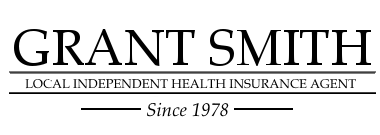It doesn’t cost any more to have a personal, independent health insurance agent…it pays!
Questions about Individual Disability Income Insurance?
What is Individual (Personal) Disability Income Insurance?
 Individual (Personal) Disability Income Insurance is the industry name for a plan that provides for periodic payments of benefits when a disabled insured is unable to work. The insurance product is designed to replace anywhere from 45 to 65% of your gross income on a tax-free basis should illness keep you from earning an income in your occupation. Every disability policy is different and should be assessed by the consumer based on the quality of plan created for the individual’s needs and not by the cheapest disability insurance policy on the market. Many consumers do not plan for the possibility that they will be faced with a debilitating accident or illness during their working years. A professional with a family, for example, should consider disability insurance a necessity. For a consumer, it is not a required purchase like home owner’s insurance. Individuals believe they may have disability coverage through their employer. This at times may be true, but the quality of coverage often leaves the disabled employee short of the protection he/she thought they had. A qualified insurance agent can assist the consumer with exploring the sources of income the consumer will need and have available during a disability.
Individual (Personal) Disability Income Insurance is the industry name for a plan that provides for periodic payments of benefits when a disabled insured is unable to work. The insurance product is designed to replace anywhere from 45 to 65% of your gross income on a tax-free basis should illness keep you from earning an income in your occupation. Every disability policy is different and should be assessed by the consumer based on the quality of plan created for the individual’s needs and not by the cheapest disability insurance policy on the market. Many consumers do not plan for the possibility that they will be faced with a debilitating accident or illness during their working years. A professional with a family, for example, should consider disability insurance a necessity. For a consumer, it is not a required purchase like home owner’s insurance. Individuals believe they may have disability coverage through their employer. This at times may be true, but the quality of coverage often leaves the disabled employee short of the protection he/she thought they had. A qualified insurance agent can assist the consumer with exploring the sources of income the consumer will need and have available during a disability.
How Much Does DI Cost?
Perhaps, more than most other type of insurance, disability-income insurance has a variety of factors which influence the final premium. Each of the following factors will determine the actual cost:
Age: The older the applicant, the higher the premium will be. The minimum age for applying is 18 and the maximum age is usually 60.
Sex: Unlike life insurance, female rates are higher per unit of coverage than those for male applicants.
Smoker vs. Non-smoker: Those who smoke can expect to pay as much a 25 percent more for the same protection as a non-smoker.
Benefit Amount: Disability policies are typically issued with a specific monthly benefit amount, e.g., $3000/month. Unless specifically stated in the policy language, these policies do not coordinate with Social Security benefits (they pay in addition to the Social Security benefit, which usually takes a long time to get paid, if ever). As benefit amounts increase, premiums increase accordingly. Most disability companies will not issue policies with benefit amounts of more than 60 percent of an individual’s gross income.
Benefit Period: Disability policies can be written to accommodate various benefit periods. Typically, most companies offering this type of coverage provide two-, three-, five- and 10-year benefit periods. In addition, there are longer benefit periods such as “to the age of 65, 66 and 67,” which are designed to coincide with the implementation of full Social Security benefits. Some older plans offered lifetime benefits, but it is hard to find those plans today. The longer the benefit period, the higher the cost will be.
Elimination Period: Sometimes this factor is referred to as the “waiting period.” It refers to the period of time before benefits are paid. Most commonly, these periods are 30, 60 or 90 days. Waiting periods of 180 and 365 days are also available. The cost per unit of coverage decreases as the elimination period increases. Occupational Class: Most disability companies have four, five or six occupational classes into which each applicant is assigned. Those who are in professional occupations (i.e., attorneys, CPAs and architects) will be placed in the highest classification and, therefore, will have a lower cost per unit of coverage. The physician classification will
vary by carrier – some rate them at the highest classification, while others place them a notch or two below the top class. Conversely, an applicant in a blue-collar-type job will pay more per unit of coverage. All companies offering disability insurance use occupation manuals to determine the class into which an applicant will fall. The majority of these classifications are based on the carrier’s claim experience for these job categories.
Benefit Features: Some companies offer policies that are self-contained, meaning that the pricing is based on all the benefit features included in the policy. On the other hand, there are companies that will let you build your own policy to suit your needs and affordability. In this case, various benefit features (such as a better definition of disability) will be listed separately, as will their respective cost. This allows you to add or delete a feature based on need and/or cost.
Ratings: Some applicants may have a pre-existing health problem that may cause the insuring company to place an extra rating on the policy. This is to protect the company against the extra risk it is assuming. These ratings can range from 25 to 100 percent.
Given that there are so many different factors influencing the rate for any one individual, it is little wonder that there is no simple answer to the question of “How much does disability income insurance cost?” However, as a general rule, you should plan on premiums being in the 1.5 to 3 percent of gross income range. But the true cost of disability income insurance lies in the value of the product and the total benefit that may be available. For example, calculate what the total monthly benefit will be if you were to purchase a policy tomorrow and go on claim the very next month. The figure will be very significant – perhaps into the millions. Then calculate the first annual premium for all coverage and divide it by that significant total benefit and you get a “tiny” cost that will be less than most term life insurance premiums per $1,000 of death benefit. Remember, you could pay the first premium on your disability income plan and a few months from your purchase date suffer a serious and totally disabling condition for the balance of your life (or at least to age 65). Individual DI is the basis for a financially secure future!

Business Hours:
Our Location

Grant Smith
Insurance Agency, LLC
2916 Pine Grove Avenue
Port Huron, MI 48060
Phone: (810) 984-1373
Fax: (810) 984-1384
Email: grantsmith@grantsmith.com
Located at:
Note:
The Grant Smith Health Insurance Agency is not affiliated with the U.S. Government or Federal Medicare Program.
Third Party Organization Disclaimer
“We do not offer every plan available in your area. Currently we represent three organizations which offer 25 products in your area. Please contact Medicare.gov, 1-800-MEDICARE, or your local State Health Insurance Assistance Program (SHIP) to get information on all of your options.”



